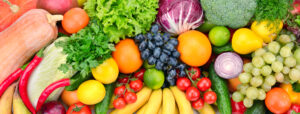February 16, 2021 | Black & Kletz Allergy

The symptoms of seasonal allergic rhinitis may include nasal congestion, runny nose, itchy nose, sneezing, itchy eyes, watery eyes, and/or red eyes during tree, grass and/or weed pollinating seasons. In our geographical area, the trees and grasses pollinate mostly in Spring and early Summer and the weeds, especially ragweed, pollinate in the Fall. It is common for these individuals to experience the symptoms during those seasons. The underlying mechanism of oral allergy syndrome is a genetically determined “sensitization” of the immune system to various pollens and subsequent “reactions” when exposed to these pollens. The immune system considers these pollens as “foreign” and thus reacts against them resulting in the annoying symptoms of hay fever.
A number of individuals with pollen allergies will experience a situation where they will develop itching of the lips, gums, tongue, palate and/or throat after eating raw fresh fruits and/or vegetables. This condition is termed pollen food allergy syndrome or oral allergy syndrome. This occurs because of the similarity of the protein antigens in the pollen and the protein antigens of the fresh fruits and/or vegetables. The immune system which is previously sensitized to pollen will also react to the similarly structured proteins in the fruits and/or vegetables. This phenomenon is termed cross-reactivity. Thus when an individual who has a pollen allergy eats certain raw fresh fruits and/or vegetables, the person’s immune system “thinks” that they are being exposed to pollen proteins when in fact they are being exposed to fruit/vegetable proteins that have a very similar structure to the pollen proteins. The body in turn reacts to the fruit/vegetable proteins in a similar fashion as a typical allergic reaction but is usually more localized to where the food makes direct contact, such as the lips, gums, tongue, palate, and/or throat.
This condition tends to be more prominent and bothersome in the Spring months when we are exposed to higher levels of pollen. Specific tree pollen sensitivity cross-reacts with specific fruit/vegetable proteins due to the closeness in the amino acid sequences. For example, patients with birch pollen sensitivity tend to react more commonly with fresh raw pitted fruits (e.g., peaches, apricots, plums), apples, and/or carrots. Birch pollen allergy can also cross-react with peanuts and/or tree nuts.
Individuals with allergies to grasses may have a reaction to peaches, celery, tomatoes, melons (e.g., cantaloupe, watermelon, honeydew), and oranges. Ragweed pollen sensitivity in the Fall usually cross-reacts with melons, bananas, zucchini, and/or cucumbers.
The symptoms usually begin within a few minutes after eating the raw fresh fruits and/or vegetables and generally subside within a few hours. The symptoms of oral allergy syndrome typically include itching of the lips, mouth, and/or throat as mentioned above. The symptoms are usually mild, but in rare cases, can cause throat swelling and/or difficulty in swallowing. Such severe reactions are more likely to happen with peanuts and/or tree nuts. It is important to note that some people with itchy lips, mouth and/or throat after eating a raw fresh specific fruit and/or vegetable may in fact have a true food allergy to a specific fruit and/or vegetable and not have oral allergy syndrome. These truly food-allergic individuals generally will have the same or similar symptoms even when eating the fruit/vegetable cooked, unlike patients with oral allergy syndrome who can generally tolerate the cooked fruit/vegetable without symptoms.
The diagnosis is established mostly by a history of oral pruritus (i.e., itching) and irritation in patients who have previously tested positive to pollen and are symptomatic during the respective pollen seasons.
The treatment of oral allergy syndrome involves avoiding the offending raw fresh fruits/vegetables. Peeling the skin before eating and/or cooking (i.e., baking, microwaving) before eating may decrease the severity of the symptoms, as heat denatures the protein and reduces its allergenic potential.
Below is a chart from the American Academy of Allergy, Asthma & Immunology of different types of pollens and the corresponding foods that may cause oral allergy syndrome:
SPRING SUMMER LATE SUMMER – FALL FALL
Pitted Fruit
Apple X
Apricot X
Cherry X
Peach X X
Pear X
Plum X
Melons
Cantaloupe X
Honeydew X
Watermelon X X
Other
Banana X
Kiwi X
Orange X
Tomato X
Vegetables
Bell pepper X
Broccoli X
Cabbage X
Carrot X
Cauliflower X
Celery X
Chard X
Cucumber X
Garlic X
Onion X
Parsley X X
White potato X X
Zucchini X
Spices
Aniseed X
Caraway X
Coriander X
Fennel X
Black pepper X
Legumes*
Peanut X
Soybean X
Nuts*
Almond X
Hazelnut X
*Mouth or throat itching from peanut, soybean, almonds, and hazelnuts may also be an initial
manifestation of a more serious food allergy with the potential for anaphylaxis. See an
allergist/immunologist if such symptoms are noted.
© 2019 American Academy of Allergy, Asthma & Immunology.
The board certified allergists at Black & Kletz Allergy have been diagnosing and treating oral allergy syndrome and food allergies for more than 50 years. We treat both pediatric and adult patients. Black & Kletz Allergy has offices in Washington, DC, McLean, VA (Tysons Corner, VA), and Manassas, VA. All 3 of our offices have on-site parking. For further convenience, our Washington, DC and McLean, VA offices are Metro accessible. Our McLean office location offers a complementary shuttle that runs between our office and the Spring Hill metro station on the silver line. To schedule an appointment, please call our office or alternatively, you can click Request an Appointment and we will respond within 24 hours by the next business day. If you suffer from an itchy mouth or throat after eating fruits and/or vegetables or you have other food allergy symptoms, we are here to help diagnose and treat your food allergy. The allergists at Black & Kletz Allergy are happy to help you with any allergic condition that you may have as we are dedicated to providing you with the highest quality allergy care in a relaxed, caring, and professional environment.












